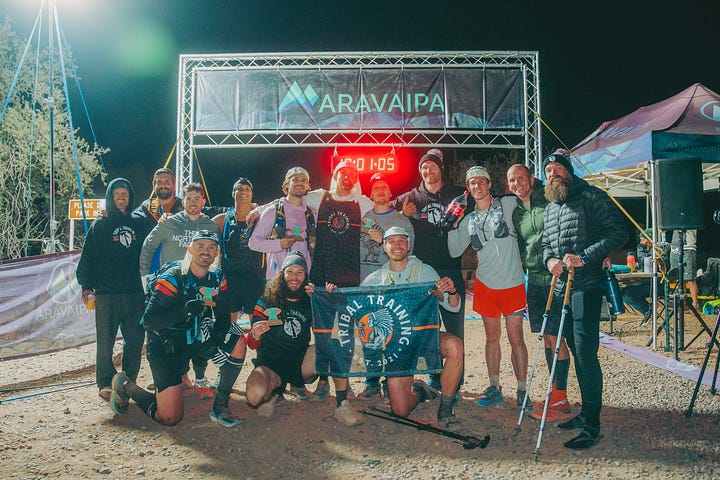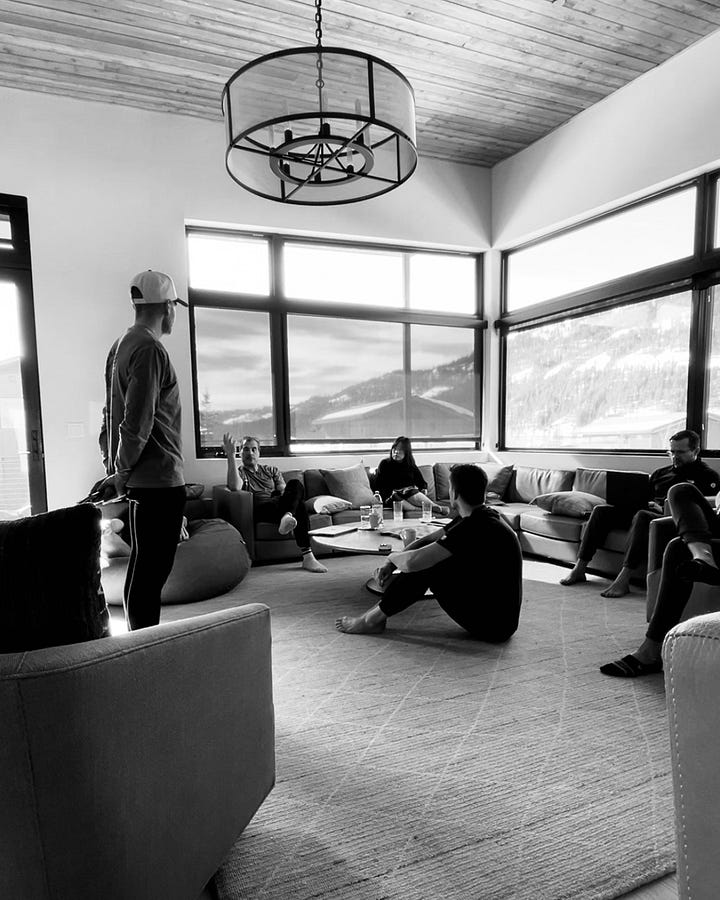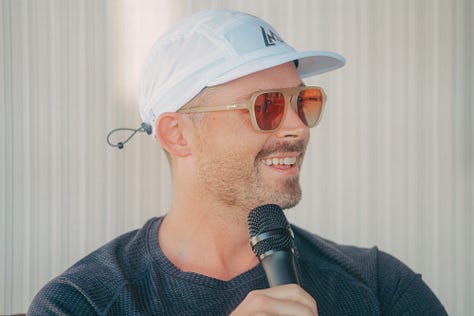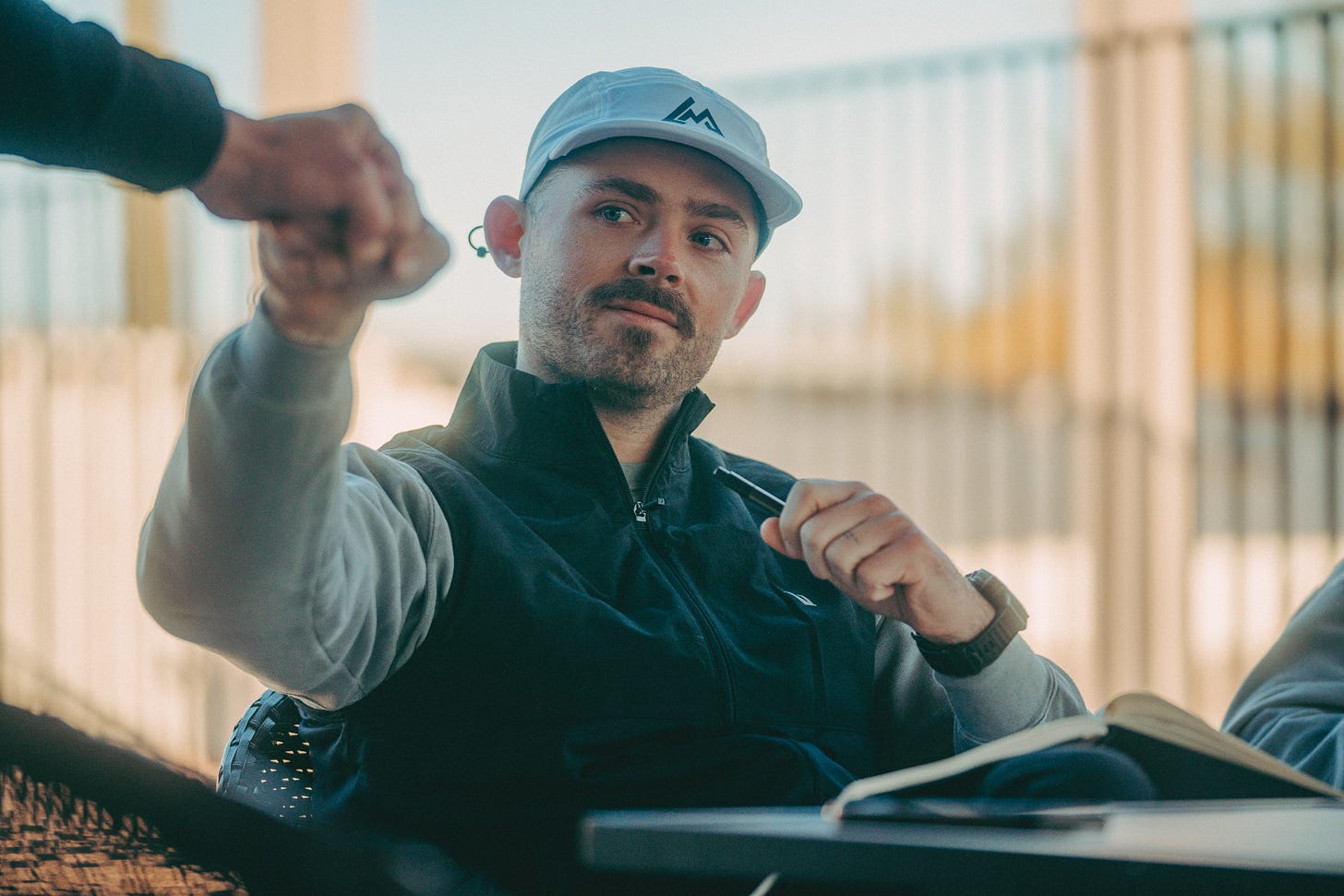How to Build a Team That Actually Feels Like a Team
What I've learned as a coach and speaker
I keep getting the same question…
It comes from Tribal athletes who also lead teams in the corporate world.
"How do I build a culture like Tribal?"
It’s a great question. And it makes sense why they ask.
Because the best leaders don’t just want their teams to hit goals.
They want something deeper…
A culture where people celebrate each other’s personal, family, and life wins
A team that sees work as a vehicle for personal growth (not just a paycheck)
An environment where teammates encourage each other because they actually care.
And they see that Tribal isn’t just a coaching program.
It’s a culture.
Athletes don’t show up just for themselves. They cheer for and encourage each other.
They push through adversity in all areas of life (not just crossing finish lines) because they feel connected to something bigger.
And guess what…
This did not happen by accident.
But it also wasn’t that hard…
I was just intentional to focus on three specifics that most leaders overlook.
And that’s what I’m going to share with you today:
In coaching, business, or leadership, a strong team isn’t built through:
job titles
org charts
corporate buzzwords
It’s built through the unspoken rules of how people interact, support each other, and show up every day.
I’ve seen this firsthand in two very different settings:
Building Tribal Training, where 60+ athletes from all over the world feel deeply connected—not just to their training, but to each other.
Leading team-building workshops at company offsites, where I’ve helped startup teams strengthen employee connection and culture.


While the environments were different, the principles of building a great team stayed the same.
Here’s what I’ve learned:
1. What You Share, They’ll Share
The tone of a team is set by its leader.
As a founder, coach, or manager, what you communicate and celebrate influences what others feel comfortable sharing.
If you only talk about race finish times and sales numbers, you will teach your team those are the only things that matter.
But if you openly celebrate:
family wins
personal life accomplishments
honest struggles and challenges along the way
You create an open space for others to do the same.
In Tribal, I am intentional to share:
photos of my family
wins as an entrepreneur
what challenges I’m facing as I stretch my creativity in podcasting, writing and public speaking
The result?
Tribal athletes do the same thing.
And everyone is encouraged to join me on the journey of total life development through endurance.
That’s why our athletes aren’t just running…
They’re writing Substacks and building side hustles too.
Lesson for Leaders: What you communicate and celebrate with your team determines the culture of your organization.
2. Create Space to Share Challenges and Triumphs
I want to feel seen.
I want to feel like I matter.
And after coaching 200+ athletes across finish lines, I’ve learned I’m not alone in these basic human needs.
In Tribal, one of the reasons our athletes feel so connected is because we actively create space for them to talk about themselves and what’s going on in their life.
We have a Team Chat and Team Call structure that gives athletes space to “grab the mic” and share their story on a daily/weekly basis.
Three additional examples of this:
hosting athletes on the Tribal Training Podcast
helping athletes write about their experiences (in races and life)
encouraging athletes to lead Team Call segments and teach what they know



At the startup offsite, I brought the same intention.
I facilitated an exercise where people shared a recent personal challenge and how they worked through it.
They got to say:
“This thing happened.
And it kinda sucked.
But I got through it.
Here’s how the experience impacted me.”
The result?
A room full of people who suddenly saw each other in a deeper way—because they weren’t just coworkers anymore, they were humans with real struggles and real perseverance.
Lesson for Leaders: When people are given a platform to share their challenges and triumphs, they become more invested in the group - because the group is invested in them.
3. Set People Up to Encourage Each Other
The #1 thing missing in the average male friendship:
Encouragement!!!
(Probably not only true of men - just speaking from my experience)
I pump encouragement into Tribal like oxygen into a Vegas casino.
Did you squeeze in a training session after work, when life gave you every reason to bail?
I want you to feel like you can overcome any circumstance life throws at you.
Did you create space for your wife by handling kid pick up and cooking dinner?
I want you to feel like the best father and husband in the world.
Did you launch a creative project into the world - writing online, building a side hustle, or puiblishing a podcast?
I want you to feel like you make the dopest fuckin’ shit the world has ever seen!!!
At the startup offsite, I brought the same intention.
I organized an exercise where everyone sat in a circle.
The prompt was simple:
Share a time you were inspired by (or admired) the effort of the person sitting to your left
The result?
You could feel the energy shift. People lit up when they felt valued.
Team members who rarely interact (like engineers and sales guys) said things like:
“Hey - we don’t work together too much, but I’ve always seen you be willing to dive into anything that’s thrown your way. And I really admire that about you.”
When people lift each other up - a group of individuals into a team.
Lesson for Leaders: Don’t just encourage your team—set up a culture where they encourage each other.
That’s where real camaraderie is built.
Reverse It
Here’s a fun way to think.
If I wanted to NOT to build a team and culture focused on connection and positivity, here’s what I’d do:
Only share and celebrate performance metrics (race times, sales numbers)
Never let people talk about their personal challenges and triumphs (reduce their significance to their output)
Expect my team to praise one another on their own (and keep departments silo’d off from the collective group)
That ain’t it!!!
A strong team isn’t just about what people do—it’s about how they feel when they show up.
As a leader, it’s your job to create and facilitate the environment that supports your vision for culture.
And what I've learned across endurance coaching and startups is that when people feel valued, connected, and invested, and you create a team that actually feels like a team.
And your results go through the roof.
P.S. I love talking to leaders who care about culture.
If this resonated with you and you’re thinking about how to apply it to your own business or team, let’s chat.
Reply to this post or send me an email at [ryan@traintribal.com].
Let’s get your vision for what you’re building bursting with life.



